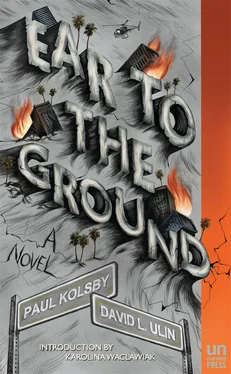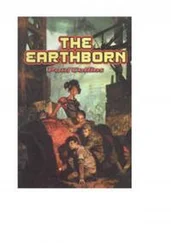“Now, now.” Ethan began to kiss some Finnish ass.
Henny Rarlin stood up and towered over Ian. “Lemme tell you something, you little child. You sold your script to Varner Brothers. They bought it for Tailspin Pictures. Now it belongs to me .”
Ian tried to swallow.
“Ian …” Grace tried again.
“You shut up,” he told her. “A week ago you wouldn’t even show the goddamn thing.”
“Not here, Ian …”
“What are they fighting about? What are you fighting about?” Henny Rarlin wanted to know.
“Nothing,” Ethan said. “Creative differences.”
“I am the director. Who are they to be having creative differences?”
The room fell silent. Ian fiddled with his glasses. With his eyes, Ethan told Grace to apologize. Right. This is business, she realized. And sometimes business sucks. But then she caught a glimpse of Ian, his expression so smug it nearly knocked her off her chair. You asshole, she thought, and before she could stop herself, she hissed, “If it weren’t for Charlie’s prediction, nobody would’ve looked at your fucking script.” Then she got up and stormed out of the room.
Grace was so angry she could barely see the road. She shouldn’t have walked out like that, but all she could think about was breaking up with Ian as soon as she got home. Seven months she’d given to that obnoxious come-lately, and she’d be damned if she’d give any more.
When she turned west onto Franklin, Grace was thoroughly blinded by the setting sun. She pulled to the curb, rooted around in her bag for sunglasses, looked up, and saw a 7-Eleven located conveniently before her. The next thing she remembered was paying for a pack of Merits and getting back into the car. For old time’s sake, she pushed in the dashboard lighter, tore off the cellophane and aluminum wrapping, and tried to retrieve a cigarette before the contraption popped out. Grace examined the lighter’s glowing tip before giving life to the Merit hanging from her lips. She smoked without shifting position and felt a dizziness that soon passed. Then she lit another and, refreshed, pulled back into traffic. And so, in a time of need, Grace had been reunited with an old friend.
“We live in an age of sound bites and media hype.” The governor smiled across his audience, meeting every attending pair of eyes. “It has become possible to transmit and receive information alarmingly quickly — to compose quickly, send quickly, receive quickly, and, sadly, react quickly. I read everything printed about this sensational prediction, really dug there in the science. But I’m shaking my head. And I’ve been talking to a lot of people who’re shaking their heads, too. Scientists and scholars and heads of universities — they think it’s hullabaloo. But the media spun it into a story, and with that story, they sell papers. I’m all for enterprise, but what we pay for when we buy newspapers, or when we’re watching the news on television, is the truth. So I say, if there’s an earthquake coming, let it be proven beyond a reasonable doubt — in this nation, under God, with liberty. Because in the world of speculation and sensationalism, there is no justice for all. God bless California. And God bless the United States of America.”
EARTHQUAKES MEANT BIG MONEY. STERLING CARUTHERS knew that. Loma Prieta had paid off sixteen billion dollars, and Northridge had come through for thirty. The key, Caruthers thought, was in knowing how to make devastation work for you.
He sat in his office at the Center for Earthquake Studies pondering just that, watching stock quotations and real estate prices scroll down his computer screen. Both were declining steadily, but he knew there was a way to make a killing from it all. There must be a passage through those numbers, a pathway to exorbitant wealth. It was just a matter of solving the equations, of studying the situation until the proper combinations made themselves known.
Caruthers thought about the moguls. What would they have done? The Chandlers, the Dohenys, the Harrison Gray Otises. Men of vision, he thought, who made a killing in the San Fernando Valley, way back in 1904. Caruthers sat in his swivel chair, and praised the science that had brought him to the threshold of an opportunity this large. Watching columns of numbers cascade on his monitor, he opened his mind to the world of speculation, lighter than air.
But Charlie Richter lived in the world of doubt and deliberation, and suffered from the disease of integrity. Was predicting earthquakes any better than snooping around, telling someone her husband or his wife was unfaithful? Was he providing a service ? Or just gossiping scientifically, on a global scale?
Whatever the case, in the past week he had come to be perceived as a doomsayer, less a scientist than a hack. First came the governor’s speech, and now everyone from Maggie Murphy to Jay Leno found fault with Charlie’s work. What a laugh! Suddenly, everybody was a seismologist.
More than ever before, Charlie lived and breathed and slept with his numbers. At the moment, in fact, he was eating with them — at the bar of the Authentic Café. What could he do, he wondered, to prove this earthquake beyond a reasonable doubt? And what did “reasonable doubt” mean? As a legal expression it referred to past events, but Charlie was venturing into the future. What could he do when everyone was so numerically illiterate?
Charlie left his wonderings and looked up. He didn’t expect to see anything, but there, across the dining room, was Grace, having dinner with a long-haired man of unknown identity. Charlie wondered if she had spotted him earlier, when she’d come in; and then he considered what she’d do if their eyes were suddenly to meet. It was a game he played to test a woman’s love, a silly and unscientific game, but Charlie played it anyway. And this time, he won. Grace covered her mouth with a napkin and jumped up from her chair. When she excused herself, her companion looked concerned.
Charlie stood as Grace approached somewhat defensively.
“Are you OK?” she asked him. “I tried to call you.” She looked back at her table and smiled.
“It’s been …” Charlie suddenly felt depressed.
“Ian and I broke up.”
“Really?” He brightened, but without letting her see. Then she noticed Charlie noticing the long-haired man.
“It’s business,” she told him. “A film maker.”
“When did you and Ian …?”
“This morning.”
He smiled. “How many times have you two broken up?”
“Don’t make fun of me, Charlie.”
Henny Rarlin got up then and strode across the restaurant, embarrassed that a man of his stature would be left sitting alone. Grace explained to Charlie that Henny had made Die Hard as a Rock. He thrust his hand into Charlie’s and spit out his name like an Uzi fires bullets. Then, he took Grace by the elbow and tried to steer her toward their table.
“What are you doing?” she said, and pulled away.
Diners looked up as Henny Rarlin ranted. “Are you having dinner with him, or me !?” Charlie gestured for his check, and Rarlin said something he couldn’t hear. Grace slapped the film maker’s face, and stalked out of the restaurant. It all happened so quickly, Charlie just laughed.
It was laughter, probably, that gave him the idea. His body’s convulsing, the release of tension, the movement of unnoticed muscles. Five minutes later, at a pay phone on Beverly, Charlie called someone at ABC News. Then he jumped into his car and headed east on the 10.
Outside of Indio, he saw them — the vans, the crews. A helicopter hovered. When he pulled up, a sea of microphones came through his driver-side window, so he told the one about the Pirate and the Parrot, and they all laughed.
Читать дальше












